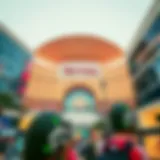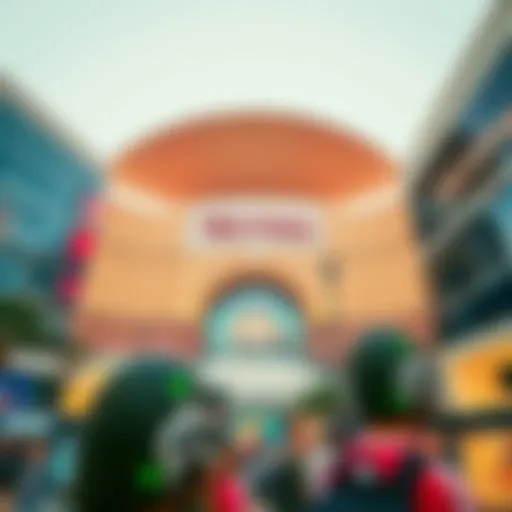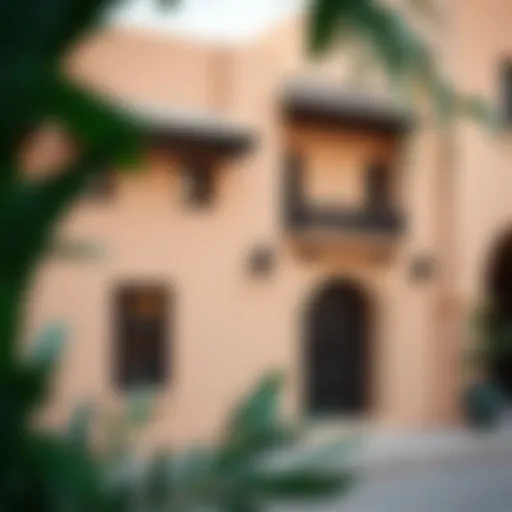Dubai Real Estate: Investment Insights and Trends


Market Trends and Insights
Current Market Conditions
Dubai's real estate landscape is a fascinating tapestry woven with a myriad of threads, from luxurious skyscrapers to tranquil villa communities. As of late 2023, the market is experiencing a noticeable resurgence after the tumultuous times posed by global events. Property prices, having established a trajectory of incremental growth, have piqued the interest of both domestic and international investors. The influx of expatriates seeking opportunities in trade, technology, and tourism continues to fuel demand for both residential and commercial properties.
With recent reports indicating an upswing in transactions, it’s worth noting that some neighborhoods are consistently outperforming others. For instance, areas like Dubai Marina and Downtown Dubai stand out, showcasing high rental yields and property appreciation. The trend of short-term rentals, fueled by the city's vibrant tourism sector, is also carving a niche for property investors who wish to capitalize on the influx of visitors eager to experience everything Dubai has to offer.
Future Predictions and Projections
Looking ahead, it's important to consider several factors that are likely to shape the real estate scene in Dubai. Experts predict that the introduction of new regulations aimed at easing investment processes will attract more overseas buyers. Furthermore, the hosting of global events and initiatives such as Dubai Expo 2024 are set to bolster the city's profile as a prime investment destination.
Real estate analysts foresee that the demand for affordable housing will rise, particularly among young professionals and families. This suggests a gradual shift towards developments catering to this demographic while sustaining luxury avenues as well. The resilience of Dubai’s market amidst global uncertainty, combined with ongoing infrastructural expansions, paints a robust picture for the near future.
"Dubai's real estate market is not just about buildings; it's about creating communities fit for a modern lifestyle."
Investment Opportunities
Emerging Neighborhoods
As investors explore the ever-evolving landscape, certain neighborhoods increasingly attract attention. Areas like Dubai Creek Harbour and Dubai Hills Estate are emerging hotspots, characterized by their strategic locations and integrated lifestyle offerings. These neighborhoods are being designed with sustainability in mind, attracting environmentally-conscious investors.
Another noteworthy mention is Jumeirah Village Circle (JVC), which is seeing a surge in property development, appealing to both investors and renters. It’s the kind of place where the affordability doesn't compromise the quality of living, making it ripe for investment.
Types of Properties to Invest In
The diversity in property types can be bewildering, but it also provides ample opportunity. Here’s a breakdown:
- Luxury Apartments: In hotspots like Downtown Dubai, these properties offer breathtaking views and chic amenities, attracting high-income tenants and buyers.
- Villas: Areas like Emirates Hills are desirable for those looking for spacious living that offers privacy and exclusivity.
- Commercial Properties: Office spaces in areas such as the Dubai International Financial Centre (DIFC) continue to lure businesses, making them a sound investment choice for generating steady returns.
- Off-Plan Properties: Investing in off-plan developments not only allows for lower entry prices but also the potential for significant capital appreciation by the time the property is completed.
These insights offer a glimpse into the complex and rewarding domain of Dubai’s real estate market. Whether you are a seasoned investor or a first-time buyer, understanding current and emerging trends is crucial for informed decision-making.
Preamble to Dubai's Global City Concept
Dubai stands as a beacon of modernity in an ever-evolving global landscape. As a global city, it presents a unique blend of culture, commerce, and architecture. Understanding this concept is pivotal for anyone interested in its real estate market, as the infrastructure and regulations reflect the ambitions set forth by the Dubai government. The city has transformed remarkably over a few decades, attracting investors, expatriates, and tourists in droves.
So what exactly makes Dubai a global city? It’s not just about eye-catching skyscrapers like the Burj Khalifa or its luxury shopping districts. There's much more under the hood. The city's strategic location acts as a bridge between the East and West, making it a hub for trade and tourism.
The thriving economy, supported by various sectors beyond oil—such as tourism, retail, and finance—has placed Dubai in a position of strength. This economic diversification has fostered resilience against market fluctuations. Furthermore, the city's commitment to becoming a leader in technology and innovation enhances its global stature.
Consider the following elements:
- Cultural Tapestry: A melting pot of cultures, Dubai's demographics are a vast mix of nationalities, allowing for a rich social experience. This diversity plays a major role in the real estate sector, attracting various types of properties to cater to different cultural preferences.
- World-Class Infrastructure: With state-of-the-art transport systems like the Metro and well-maintained road networks, getting around is a breeze. This infrastructure not only boosts daily living but is also a magnet for businesses looking to set up shop.
- Business-Friendly Policies: The absence of personal income tax and the establishment of free zones provide favorable conditions for entrepreneurs and international companies. These incentives lead to increased demand for office spaces and commercial properties.
Key Considerations
When diving into the real estate market in Dubai, it's essential to keep a few considerations in mind:
- Regulatory Framework: Understand the laws and regulations that govern property ownership, as this can vary significantly depending on the type of property and ownership structure.
- Market Dynamics: Stay informed about trends, such as price fluctuations and emerging neighborhoods, as these can affect the viability of investments.
- Long-Term Vision: Individuals and businesses looking to invest in Dubai should approach it with a long-term perspective, as market developments can often take time to materialize.
To sum it up, the concept of Dubai as a global city encapsulates its rapid transformation into a dynamic metropolitan center that fosters growth, innovation, and unparalleled opportunities. Keeping a diligent eye on these factors will help navigate the complexities of the Dubai real estate market, making it a worthwhile venture for investors, homebuyers, and developers alike.
Historical Context of Dubai's Transformation
Understanding the historical context of Dubai's transformation is pivotal for grasping its current real estate landscape. As the city evolved from a modest fishing village to a global powerhouse, this transformation has shaped not just the architecture but also the societal norms and economic frameworks of the region. Delving into this history offers insights into how the unique blend of ambitious governance and strategic economic plans have driven Dubai to its present status.
Early Development and Economic Diversification
In the early days, Dubai was like a drop in the ocean, with its economy primarily relying on fishing, pearl diving, and trade. Coastal trade routes connected the region to India and the Persian Gulf, allowing it to develop some degree of economic activity. But as the sun set on the 20th century, the discovery of oil in the 1960s dramatically shifted the economic landscape. While oil revenues initially funded rapid infrastructure development, the crucial step was the city’s commitment to economic diversification.
The government of Dubai realized that dependency on oil alone was a dangerous game. Thus began a concerted push to diversify the economy. Investments in sectors such as tourism, aviation, and real estate carved out a more resilient economic profile. This forward-thinking plan not only attracted foreign investment but also painted Dubai as a lucrative destination for global business. Examples of this diversification can be seen in projects like the iconic Burj Khalifa and the burgeoning aviation market, with Dubai International Airport becoming one of the busiest in the world.
The Role of Oil Revenue in Urban Expansion
Oil revenues laid the groundwork for Dubai’s urban expansion, morphing the once-sleepy fishing town into a glittering cityscape. In the 1970s and '80s, the influx of oil wealth triggered a construction boom, making way for opulent hotels, sprawling malls, and extravagant residential complexes. This development was not just for show; it served to entice international businesses and expatriates to settle in the region.


While oil revenue was the spark, the true flame of growth came from how these funds were utilized. Investments led to the establishment of free zones, allowing businesses to flourish with minimal taxation and minimal restrictions. Such environments promoted entrepreneurship and ensured a continual flow of capital, making Dubai synonymous with modernity.
Moreover, investment in public infrastructure—roads, schools, and healthcare systems—was crucial for supporting a growing population. Without these necessary frameworks, the ambitious plans could have fallen flat. Essentially, oil revenue acted as both a financial cushion and a launching pad.
"With vision, Dubai turned limited resources into infinite possibilities, shaping a destination that’s now a blueprint for emulation."
In summary, the historical context of Dubai's transformation sets the stage for understanding the current real estate dynamics. It highlights the strategic choices made that allowed this city to grow into a vibrant hub of investment, culture, and innovation. With a solid framework established, investors today can appreciate not just the properties but the stories woven into the very fabric of Dubai.
Key Features of the Global City
Understanding the key features of Dubai as a global city is essential for anyone looking to navigate its thriving real estate market. These features encapsulate the essence of what makes Dubai not just a destination but a canvas of opportunity where investment, lifestyle, and innovation converge. Investors, homebuyers, and real estate professionals must recognize these attributes to make informed decisions pertinent to both property acquisition and urban development.
Architectural Innovations and Landmarks
Dubai stands tall as a beacon of modern engineering and design, thanks to its architectural innovations that redefine skylines and push boundaries. Iconic structures such as the Burj Khalifa and the Dubai Frame are more than just buildings; they symbolize the aspirations of a city fueled by vision and ambition.
- Burj Khalifa: Standing at a staggering height of 828 meters, this skyscraper holds the title of the tallest building in the world. It attracts millions of visitors annually, boosting tourism and, consequently, the real estate market.
- The Dubai Frame: This architectural marvel connects the old city with the new, offering stunning views and a unique perspective on Dubai's evolution. Real estate developments in its vicinity benefit from increased visibility and desirability.
These landmarks not only attract global attention but also serve as crucial factors in the valuation of properties nearby. Prospective buyers often seek residences close to these architectural wonders, thereby maintaining high property values and opening up lucrative rental opportunities for investors.
Moreover, Dubai's embrace of sustainability is visible in its urban planning and building designs. Projects like the Sustainable City highlight the integration of eco-friendly solutions within architectural frameworks, steering the market toward a greener future. This shift is particularly appealing to environmentally conscious investors looking to align with contemporary market demands.
Cultural Diversity and Social Fabric
Cultural diversity is the lifeblood of Dubai, shaping its social fabric and enriching the living experience for expatriates and locals alike. With over 200 nationalities calling this city home, the eclectic mix fosters a unique communal atmosphere that seamlessly blends traditions from around the world.
- Culinary Scene: This diversity translates to a vibrant culinary landscape where one can traverse the globe through food. From traditional Emirati dishes to global gourmet experiences, the dining scene enhances the lifestyle appeal of various neighborhoods and attracts new residents.
- Events and Festivals: Dubai hosts an array of cultural events, including the Dubai Shopping Festival and Art Dubai, which unite various communities and exhibit the city’s cultural richness. Such events not only bolster tourism but also increase interest in local properties, making the housing market increasingly competitive.
- Community Engagement: Neighborhoods like Al Quoz and Jumeirah witness a blend of cultures, often organizing social gatherings and cultural exchanges that foster unity. These initiatives result in a more robust sense of belonging, which can make a neighborhood significantly more desirable for those considering relocation.
In sum, Dubai's cultural diversity enhances its distinctiveness and contributes significantly to its appeal as a global city. For investors and property developers, understanding the interplay of culture and community can unlock key insights into potential hotspots for investment and development. By focusing on how properties can cater to this rich social tapestry, opportunities abound for those looking to capitalize on Dubai’s growing real estate market.
Neighborhoods of Dubai: An Overview
When one thinks of Dubai, it is impossible to ignore the myriad of neighborhoods that craft the city’s identity. Each area has its own character, charm, and lifestyle, catering to a diverse population that ranges from luxury seekers to culture enthusiasts. Understanding these neighborhoods is vital for prospective investors and homebuyers looking to make a smart move in this dynamic market.
The neighborhoods of Dubai are not just blocks on a map; they represent a blend of cultures, lifestyles, and economic opportunities. Investors who grasp the characteristics of these areas can make informed choices about where to buy, based on target markets, amenities, and the overall atmosphere of each neighborhood.
- Accessibility and Connectivity: Many of these areas are strategically located, benefiting from Dubai’s extensive transport network, including the Dubai Metro and main highways. This connectivity greatly enhances property value potential.
- Vibrant Communities: The social fabric of Dubai is woven from varied cultural influences, and each neighborhood often reflects this diversity. Investors should consider how community dynamics can affect property demand.
- Lifestyle Amenities: Entertainment options, shopping, and proximity to schools and hospitals are fundamental aspects of a neighborhood that can significantly impact real estate appeal.
- Economic Viability: Certain neighborhoods may show faster growth due to proximity to commercial activities, making them attractive for long-term investment.
Given these elements, exploring neighborhoods in Dubai can unveil hidden gems and lead to lucrative investments.
Downtown Dubai and its Iconic Skyline
Downtown Dubai stands as the heart of the city, brimming with attractions and defining landmarks, including the famous Burj Khalifa. This neighborhood is not only a commercial hub but also a cultural epicenter that blends high-end shopping, dining, and leisure options.
- Real Estate Highlights: The housing market here is characterized by luxury apartments and high-rise towers, attracting both investors and renters. The demand for properties in Downtown remains high, supported by its status as a tourist magnet.
- Public Spaces and Community Life: The area fosters a vibrant community atmosphere with parks like the Burj Park, offering families and individuals space for recreation amid urban life.
Living in Downtown Dubai is synonymous with opulence and convenience, but it also comes at a price. Investors should weigh potential return on investment against the premium pricing of properties.
Marina District: A Hub for Luxury Living
The Marina District is a prime example of Dubai’s commitment to waterfront living, featuring a stunning marina lined with yachts. This area has redefined luxury lifestyles with an array of luxurious apartments and penthouses that boast stunning views of the water and city skyline.
- Lifestyle Appeal: The marina is not just about living spaces; it’s also about the lifestyle. Residents enjoy an active lifestyle characterized by waterfront promenades, high-end cafes, and access to various leisure facilities.
- Investment Potential: The demand for property here has consistently been strong, particularly among expatriates seeking both temporary and permanent homes. Having an understanding of rental yields is crucial, as the Marina District often shows promising returns.
Thus, this neighborhood captures a slice of Dubai’s coastal elegance while presenting significant opportunities for property investment.
Palm Jumeirah: Architectural Marvel and Lifestyle Destination
No discussion of Dubai’s neighborhoods would be complete without mentioning Palm Jumeirah. This man-made island is not just an engineering marvel but also a luxurious habitat, known for its high-end resorts and exclusive residences.
- Real Estate Offerings: Properties in Palm Jumeirah range from lavish villas to luxurious apartments, attracting wealthy buyers and offering a prestigious lifestyle.
- Attractions: Home to famous destinations, such as Atlantis, The Palm, and various beach clubs, the island provides an unparalleled lifestyle filled with entertainment options.
- Investment Insights: The exclusivity and unique architectural design maintain property values, making it a hot spot for investors looking for exceptional real estate opportunities.
"The neighborhoods of Dubai weave together a rich tapestry of culture, luxury, and investment potential, creating unique opportunities for everyone."
By analyzing these key neighborhoods, potential investors can understand the diverse offerings within Dubai and make more informed real estate decisions.


Real Estate Market Dynamics
Understanding the dynamics of Dubai's real estate market is essential for anyone with a stake in property—be it investors, homebuyers, agents, or analysts. The fast-paced and ever-evolving landscape presents unique opportunities as well as challenges, and being attuned to current trends can make all the difference in making informed decisions.
The interplay between various elements—demand, supply, and economic conditions—shapes the market's trajectory. Moreover, Dubai's strategic positioning as a global city amplifies these dynamics, attracting international attention and investment. Keeping an eye on market trends not only helps in identifying lucrative investment opportunities but also equips individuals with insights needed to navigate potential pitfalls.
Current Trends in Property Prices
The real estate market in Dubai exhibits significant fluctuations in property prices, influenced by both local and global factors. As we look at recent trends, a few key observations emerge:
- Recovery from COVID-19: After a challenging period due to the pandemic, Dubai’s property market shows signs of recovery. There’s renewed confidence, primarily spurred by the city’s strategic handling of the health crisis and its burgeoning tourism sector.
- Luxury Segment Boom: High-end properties are witnessing a surge in demand. Buyers are now looking for spacious homes and amenities, driven by a shift in work-from-home dynamics and a desire for more comfortable living environments.
- Evolving Buyer Demographics: A noticeable trend is the influx of foreign investors. The increased interest from expats and international buyers, particularly from regions like Europe and Asia, is reshaping price structures. This has led to competitive pricing, particularly in premium areas.
- Off-Plan Investment Growth: Investing in off-plan properties is back on the radar. With many developers offering attractive payment plans and discounts, potential buyers are keen on securing properties at today's prices in anticipation of future value appreciation.
These trends underscore the importance of continuous market observation. With the right information, stakeholders can position themselves advantageously in a competitive environment.
Differentiators of Residential and Commercial Properties
In Dubai, the distinction between residential and commercial properties is more than just categorization; it reflects different investment philosophies and market behaviors. Here are the primary differentiators:
Residential Properties
- Market Sensitivity: Residential properties are often more sensitive to changes in economic conditions, such as employment rates and interest rates. Families and individuals are seeking affordable housing, which has been a pivotal topic post-pandemic.
- Amenities and Lifestyle Factors: Buyers prioritize lifestyle enhancements. In recent years, there has been a clear shift towards properties that offer communal spaces, accessibility to public transport, and proximity to recreational areas. These determining factors can significantly influence property values.
- Sustainability Features: There is a growing preference for properties that follow sustainable practices, such as energy-efficient buildings and green spaces, which have become important not just for residents, but also for long-term investors.
Commercial Properties
- Long-term Leases and Stability: Investors often prefer commercial properties for their potential for stable returns. Long-term leases with businesses like multinational companies tend to provide more consistent cash flow compared to residential rentals.
- Location Impacts: The location of commercial properties is vital, with prime business districts fetching higher prices. An office situated in the bustling Dubai International Financial Centre, for example, offers more value than one in a less accessible area.
- Dynamic Market Reaction: Commercial real estate reacts differently to market changes. During economic upturns, demand for office and retail spaces can ramp up and plateau; meanwhile, a downturn may lead to higher vacancy rates and varied rental prices.
Key Insight: Understanding the different dynamics and trends governing both residential and commercial properties is essential for navigating Dubai's real estate market successfully.
For more information on current real estate myths and misconceptions, visit Wikipedia or check insights shared by industry professionals on platforms like Reddit.
Investment Opportunities in Dubai
The investment landscape in Dubai presents a unique tapestry woven with economic potential, cultural allure, and architectural innovation. As a burgeoning global hub, the city's real estate sector holds remarkable promise for both seasoned investors and first-time buyers. Given its strategic location and forward-thinking regulations, Dubai stands out as a vital player in international property investment. The underlying reality is that opportunities abound across various segments, each presenting distinct benefits, challenges, and considerations.
Types of Properties for Investment
When considering investments in Dubai's dynamic real estate market, one must navigate a wide array of property types. Understanding these can significantly influence investment decisions:
- Residential Properties: These include villas, apartments, and townhouses. Properties in established neighborhoods, like Downtown Dubai or Marina District, often see steady demand and lucrative returns.
- Commercial Properties: Office spaces and retail outlets are pivotal for businesses looking to establish a footprint in the city. Areas like Business Bay and Jumeirah Lake Towers are hotspots for business ventures.
- Mixed-Use Developments: These properties combine residential, commercial, and leisure spaces in one complex. The demand for such integrated living arrangements is rising, catering to urban lifestyles.
- Luxury Properties: High-end developments on the Palm Jumeirah or in Emirates Hills attract affluent buyers and investors, offering opulent living experiences that command premium prices.
For instance, the residential market has particularly flourished, with notable developments like The Residences at Marina Gate offering exquisite amenities along the waterfront, appealing to both homebuyers and investors.
Key Areas for Up-and-Coming Investments
As the city expands, new neighborhoods and developments are continually emerging, creating fresh opportunities:
- Dubai Creek Harbour: This area is being designed to be a cultural and economic center, boasting considerable investments in residential units and commercial spaces, all within close proximity to the Dubai Creek.
- Mohammed Bin Rashid City: Positioned as a significant residential area, it's set to become a desirable living space due to innovative designs and leisure facilities, attracting families and individuals alike.
- Dubai South: Envisioned as a smart city and the future home of the Expo 2020 site, this area is rapidly becoming a hotspot for both residential developments and commercial endeavors, thanks to its favorable location near the Al Maktoum International Airport.
"Dubai's real estate landscape is not just about luxury; it's about smart investments in emerging neighborhoods that structurally align with future growth trends."
In summary, diving into Dubai's investment opportunities requires an understanding of the diverse property types available, along with insight into emerging neighborhoods that promise growth. To steer through the complexity, investors should keep abreast of market trends and demand, ensuring informed choices that align with their investment goals.
Challenges in the Dubai Real Estate Market
Navigating the complexities of Dubai’s real estate market is not without its hurdles. As investors and homebuyers dive into the vibrant landscape, understanding the inherent challenges is crucial for making informed decisions. The matters at hand, often layered and multifaceted, include economic fluctuations, evolving regulations, and pressing sustainability concerns.
Investors need clarity on these issues to mitigate risks and take advantage of opportunities. It’s essential to grasp how the local market can shift unexpectedly, impacted by both global trends and local regulations. With this in mind, let’s delve into two fundamental challenges that shape the current climate of Dubai’s real estate sector.
Market Volatility and Regulatory Changes
Market volatility in Dubai can often feel like a rollercoaster ride; what goes up, must come down, or so the old saying goes. Property prices have been known to swing wildly in response to various factors, including geopolitical tensions, oil price fluctuations, and global economic downturns. And with such unpredictability, it can be a real guessing game for investors looking to make a quick profit.
Becoming attuned to the nuances of this market means keeping an ear to the ground for regulatory changes. In recent years, the government has rolled out various measures aimed at stabilizing the market. These reforms can include alterations in ownership laws, shifts in taxation, and various incentives aimed at attracting foreign investments.
For investors, the key to success lies in thoroughly understanding these changes. Engaging with local real estate experts and staying updated on legislative frameworks can help cushion the impacts of this volatility. Over time, this can translate into a more favorable return on investment.


Sustainability and Environmental Concerns
As Dubai stakes its claim in the global arena, sustainability has emerged as a pressing concern. The environment is no longer an afterthought; rather, it is at the forefront of the conversation. The tall glass towers and sprawling villas that characterize the cityscape come with a significant carbon footprint.
Environmental considerations can seriously influence property desirability. Buyers are increasingly ethical in their investments, demanding developments that prioritize eco-friendly practices. Innovations in green building technology and renewable energy sources are not just trends—they are becoming integral to property development.
Moreover, rising temperatures and dwindling resources push the conversation about sustainable practices in real estate. Developers have started to look beyond traditional building practices, experimenting with materials and designs that harmonize with Dubai's unique climate. Finding that balance between comfort, luxury, and respect for the environment can lead to properties that not only attract buyers but also meet the sustainability standards increasingly sought after in today’s market.
The Role of Technology in Real Estate
In the fast-paced world of real estate, technology serves as a significant force that reshapes how properties are bought, sold, and managed. Dubai, as a burgeoning global city, is no exception to this trend. With the city's rapid development and its quest to enhance its market appeal, the integration of technological advancements has become essential. This section examines how technology influences not just the efficiency of transactions, but also the overall experience of investors, homebuyers, and various stakeholders in the real estate landscape.
Emerging PropTech Innovations
PropTech, or property technology, denotes the application of technology to facilitate and improve real estate operations. In Dubai, several innovations have emerged, driven by both local and international entrepreneurs keen to leverage the city's unique market. These innovations range from smart building technologies to advanced data analytics and virtual reality.
Smart Buildings: One notable trend is the rise of smart buildings equipped with IoT (Internet of Things) devices. These buildings provide residents with control over various functions, such as lighting and heating, through mobile applications. From the sustainability perspective, smart buildings often employ energy-efficient technologies, reducing overall energy consumption, which is a growing concern in today's world.
Online Platforms and Marketplaces: Another game-changer is the advent of online platforms that simplify the property-buying process. Websites like Property Finder and Bayut are popular in Dubai, allowing for simultaneous searches across multiple listings, complete with detailed comparisons and data. Investors and homebuyers can assess properties without physically visiting each location, saving time and resources.
Data Analytics: Data-driven decisions are becoming the norm. By harnessing big data, stakeholders can analyze trends, forecast market movements, and make well-informed decisions. This level of insight is invaluable for identifying profitable investment opportunities.
By focusing on ease of access and information transparency, these innovations substantially benefit Dubai's real estate market. As more people embrace technology, we can foresee increased engagement and diversified investments.
Impact of E-commerce on Property Demands
No longer confined to traditional retail spaces, the impact of e-commerce on real estate demand is significant, particularly in Dubai. The rise of online shopping has shifted consumer behavior and subsequently, the types of commercial properties that are in demand.
Warehouses and Logistics Hubs: One clear trend is the increased demand for warehouses and logistics centers. As online shopping continues to grow, the need for facilities that can handle quick distribution and fulfillment of orders skyrockets. Investors in Dubai recognize this shift, prompting a surge in warehouse developments on the outskirts of the city or near major transport infrastructure like the airport and seaport.
Mixed-use Developments: The blending of residential and commercial spaces becomes essential in accommodating lifestyle changes. E-commerce affects consumer habits, leading to preferences for neighborhoods that combine living and shopping experiences. Developments that include retail options alongside residential units tap into this shifting demand, offering convenience to residents and attractive investment returns for developers.
In summary, technology plays a pivotal role in navigating the complexities of Dubai's real estate market. Whether it's through emerging PropTech innovations that boost operational efficiency or the effects of e-commerce on property type preferences, investors and stakeholders must adapt to these changes for successful ventures in the dynamic landscape of Dubai.
Future Projections for Dubai's Real Estate Market
Understanding what the future holds for Dubai's real estate market is crucial for investors, homebuyers, and analysts alike. This topic is not just about numbers; it’s about anticipating the shifts in market dynamics, cultural trends, and economic conditions that can affect investment decisions. With Dubai’s ambitious goals under the Dubai 2040 Urban Master Plan, which aims to make the city a global urban center for economic growth, the path forward appears vibrant, albeit with challenges. Diving deep into these projections helps stakeholders navigate the complexities of this dynamic landscape effectively.
Economic Indicators and Market Adjustments
When assessing the future of Dubai’s real estate, economic indicators play a pivotal role. Various metrics, such as GDP growth rates, inflation levels, and employment statistics, provide insight into how robust the market may be in the coming years. Considering the recent rebound in tourism and business activity post-pandemic, these indicators are starting to paint a positive picture.
- GDP Growth: As the economy expands, demand for both residential and commercial properties is likely to rise. Dubai's GDP has shown resilience, maintaining growth from various sectors, including trade and services.
- Inflation Rates: While moderate inflation can be a sign of a healthy economy, soaring rates may lead to increased costs, impacting buyer confidence and ultimately the real estate market.
- Employment Trends: A stable job market encourages buying power among residents, creating a favorable environment for property investment.
Key Considerations
A few factors that deserve attention include:
- Global Economic Situation: The interplay between local markets and worldwide economic trends can lead to shifts in demand.
- Regulatory Changes: Potential changes in laws or guidelines affecting property ownership (especially for foreigners) can dramatically influence investor behavior.
- Technological Advancements: With ongoing technological innovations, the potential for PropTech to streamline transactions or enhance property management is significant.
The End: The Future of Dubai as a Global City
The trajectory of Dubai as a global city is not merely a product of its rapid development but a tapestry woven with ambitions, investments, and ongoing evolution. Understanding this conclusion is essential as it highlights how Dubai is positioned for not just sustaining growth but also becoming a beacon for global commerce and living standards.
Dubai's real estate market, characterized by luxury towers and sprawling developments, stands as a testament to its ambition. However, future developments need to be attuned to more than just aesthetics.
Key Elements to Consider
- Sustainability: As environmental concerns increasingly influence investments, Dubai’s focus on green buildings and eco-friendly urban design becomes paramount. The emirate's commitment reflects a global trend toward sustainable living, appealing to environmentally-conscious buyers.
- Technological Integration: The embrace of smart city technologies will undeniably play a crucial role in enhancing urban living. From smart homes to the integration of AI in property management, being on the cutting edge can draw in tech-savvy investors and residents alike.
- Cultural Landmarks: Investment in cultural facilities and tourism attractions will not only drive economic growth but will enhance the city's appeal. Unique landmarks that resonate with an international audience contribute immensely to the global positioning of the city.
Benefits of the Offered Insights
Understanding Dubai’s future as a global city empowers potential investors and homebuyers. Knowledge of trends such as:
- an increasing push for mixed-use developments,
- the growing importance of lifestyle-oriented locales,
- and shifts in target demographics can better inform purchasing choices.
Considerations for Stakeholders
Investors should consider the potential impact of geopolitical trends and fluctuating market conditions on property values in the region. Continuous engagement with local policies and insights from real estate analysts will be constructive in navigating this complex landscape. The rising demand for properties among expatriates and the middle-income workforce can turn out to be of major importance. Investors can capitalize on this by aligning their portfolios with the evolving market dynamics.
"Dubai is not just building a skyline; it’s crafting an identity that resonates globally."
In light of these factors, the future of Dubai as a global city appears promising yet challenging. For homebuyers and investors, acknowledging trends and adapting to the city's ever-changing fabric can open doors to numerous opportunities. As such, the real estate landscape in Dubai is not merely about brick and mortar; it reflects a broader narrative of growth, resilience, and a vision that goes beyond the horizon.















